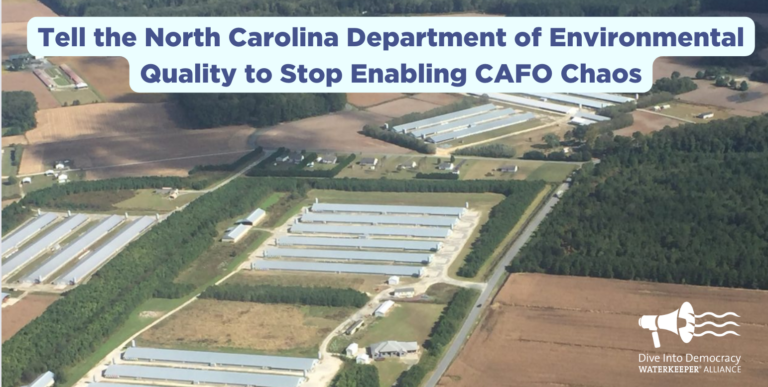Tell the North Carolina Department of Environmental Quality to Stop Enabling the Chaos That CAFOs Create
By: Thomas Hynes

Farming in North Carolina is not what it used to be. Profit-driven industrial giants have eradicated the traditional “family farm” model of agriculture. In its place are industrial scale animal factory farms known as concentrated animal feeding operations, or CAFOs, many of which can individually produce as much fecal waste as an entire city. Unlike human waste, which generally requires extensive sanitization by waste treatment plants, CAFO waste requires no comparable treatment before it can be discharged. These facilities, and the vast reservoirs of waste they create, are having a devastating effect on surrounding communities and waterways.
Unfortunately, the North Carolina Department of Environmental Quality (NCDEQ) has issued draft general permits for hogs, dairy/cattle, and poultry that would allow operators to pollute North Carolina communities and the environment even more than they already do.
Their proposal would allow CAFO operators to apply far more animal waste to crops than what is needed to uptake as fertilizer. The permits would result in loads of additional, dangerous phosphorus building up in the soil, creating a long-term source of legacy nutrient pollution in North Carolina’s waterways. The general permits would also give operators permission to let their lagoon waste pits’ solid sludge build up to dangerously high volumes, threatening the public and the environment with a greater risk of overflows. On top of all that, they are also making it harder for affected communities to participate in the public comment process of the general permits.
That is why we are calling on the North Carolina Department of Environmental Quality to reform their permitting process and finally put an end to the CAFO crisis.
CAFO pollution actively harms the health and safety of communities throughout North Carolina. The waste from CAFOs is often stored in “lagoons,” which are just open waste storage pits more accurately described as cesspools. The excess waste, of which there is a lot, is sprayed on fields under the guise of “fertilizer.” Instead, much of this foul waste often runs off into nearby water bodies and seeps into the groundwater.
Over the past two decades, Waterkeeper Alliance and our member groups have taken hundreds of flights to document this, and now we’re seeking to strengthen these draft general permits.
CAFO pollution can also cause toxic algal blooms, as well as several adverse health effects, including brain damage, dizziness, headache, nausea, burning eyes, and other illnesses.
What’s worse is that the harm caused by CAFOs is disproportionately experienced by communities of color, low-income communities, and under-resourced rural communities in which CAFOs are densely concentrated. The individuals most directly impacted by this wretched enterprise are routinely the ones least consulted.
That is why we must tell the North Carolina Department of Environmental Quality to finally put the interests of people above the profits of industrial corporations.
The North Carolina Department of Environmental Quality is accepting public input between now and November 3rd.
Leave your comment today!